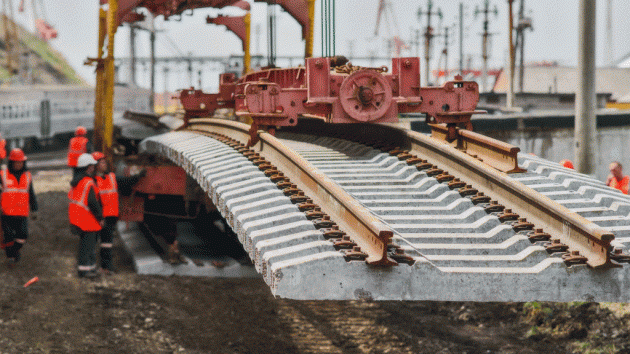Construction of One Giga solar park to begin in summer 2013 - Feed-in tariff system outdated for large projects
 Monday, 11.02.2013.
Monday, 11.02.2013.
 13:38
13:38
Securum Equity Partners should start building a 1,000MW solar park in late summer this year. The project symbolically called One Giga will bring a EUR 1.75 billion investment to the southeast of Serbia and EUR 28 million worth of tax revenue to the state as well as three new factories for producing photovoltaic panels.
As it was announced by people at that company back in late 2011, solar panels should be installed on an area of 3,000 hectares in the south of Serbia, in one or more locations. Ivan Matejak, manager for the Western Balkans at the company Securum Equity Partners & Associates, says to eKapija that the chosen location or locations will be unveiled soon.
- Given that large surface areas are required, we do not want to come out with incomplete information to avoid misinterpretations. Construction of the solar park is expected to start at the end of the summer 2013 at the latest - Matejak announces.
Securum Equity Partners representatives have recently met with the managers of Kolubara Mining Basin. We've asked our interlocutor whether Lazarevac has an appropriate land where solar panels could be installed:
(Ivan Matejak)
- The aim of our visit to Kolubara Mining Basin was to talk about possible cooperation, since there are some interesting areas in those locations, such as landfills and deserted mines, which could be taken in consideration as sites for installing solar panels – Matejak points out.
People at Securum Equity Partners have decided to use the energy potential of solar radiation, which is, as they say, 33% higher in Serbia than in central Europe, and to start the construction of one of the largest solar parks in the world.
This company, headquartered in the USA, is not interested in the incentives that Serbia grants for investments in renewable energy sources. They believe that the feed-in tariff system is a thing of the past.
- At the moment when we began structuring the One Giga project, which we plan to implement in Serbia, it was completely clear that the incentive model would be outdated very soon. Tendencies at that moment, as well as the current situation in leading European countries in this sector, prove that we were right - most countries, including Germany, Italy and Spain, have already abolished or are in the process of abolishing incentives for the generation of electricity from renewable sources. There are more than obvious proofs of negative effects of such development model, and the most obvious is a direct burden on already overburdened budgets of the state and the public sector treasury - our interlocutor explains.
Matejak believes that it is necessary to make a new strategy that is guided by the self-sustainability of certain project.
- Our project calls for the creation of an economy of scale that reduces production costs and makes kilowatt-hours competitive in the green energy market. Therefore, incentives, as we know them today, and mechanisms regulating them represent an outdated model for the development of renewable energy sources not only in Serbia, but also all around the world. That is also the reason why I more and more frequently use the term Post-Subsidy World. The fact that Serbia lags behind in the development of this sector does not mean that models damaging to the budget should be implemented.
A regulation applying to subsidized electricity producers, which was adopted in late January, lowered the feed-in tariff for electric power from solar plants from 23 to between 16.25 and 19.77 euro cents, depending on the power plant's capacity. However, neither a decrease nor increase in feed-in tariffs will affect future decisions concerning the construction of this solar park.
- This regulation will affect those who do not use feed-in tariffs to facilitate the sustainable development of renewable energy sources, but to make extra profits, which is essentially what these incentives have been over the last ten years. The new tariff will probably affect that category of investors.
Our interlocutor stresses that the state should regulate the electricity market because securing for renewable energy sources a share in the final consumption is not only a normative imperative or an economic opportunity, but also an important civilization shift in the understanding of our living environment.
- The legislator should participate in the regulation of this field by defining the goals to achieve, but not in the way that has lately showed some significant weaknesses. In that regard, regulation of market mechanisms for green energy should be the path to follow instead of granting incentives. The main players in the electricity market should be obligated to achieve an energy mix, whose cost shall be determined in the market on the basis of green energy supply and demand mechanisms, whereas end-users shall pay for the energy they consume.
Matejak adds that it is necessary to determine the real price of electricity generated from fossil fuels, which is by far higher than the current one, which represents a social category.
- We should have in mind the fact that developed countries include direct costs of production and external costs in that price, with the first and most important external cost being environment pollution. So-called "internalization of external costs" must become an integral part of the pricing of electricity generated from, for example, coal or any other fossil fuel. It is necessary to think long term because energy represents a pillar where the stability and sustainability of global economic growth rest. The wish of certain investors to have their investment returned with a discrete profit within the validity period of the feed-in tariff is their legitimate goal, but it definitely does not support the vision for long-term development of a country – Matejak concludes.
Securum Equity Partners signed an umbrella agreement with the Serbian government last year. According to that document, the company should receive all required permits by April 2013 and then kick off the project implementation. The investor has promised to finish the project by 2015.
Suzana Obradovic
 Securum Equity Partners Advisory & Operations Beograd
Securum Equity Partners Advisory & Operations Beograd
 OneGiga Solar Park Incubator d.o.o. Beograd-Novi Beograd
OneGiga Solar Park Incubator d.o.o. Beograd-Novi Beograd
 EPS Rudarski basen Kolubara Lazarevac
EPS Rudarski basen Kolubara Lazarevac
Most Important News
06.04.2024. | Agriculture
Preconditions for Placement of Fresh Blueberries and Dried Plums in Chinese Market Secured

16.04.2024. | News
Jovan Ciric, Leasing Director Retail MPC Properties – MPC Echo symbolizes our desire for good ideas and innovative endeavors to spread freely and bring about positive changes

16.04.2024. | News
10.04.2024. | Finance, IT, Telecommunications, Tourism, Sports, Culture
Creative Industry – What This Serbian Economy Sector Worth EUR 2 Billion Encompasses

10.04.2024. | Finance, IT, Telecommunications, Tourism, Sports, Culture
24.04.2024. | Construction, Healthcare
Price of construction of Tirsova 2 increases to EUR 141.6 million – Contract awarded to consortium of 10 companies

24.04.2024. | Construction, Healthcare
16.04.2024. | News
Economy Fair in Mostar opens – 26 companies from Serbia exhibiting

16.04.2024. | News
24.04.2024. | Construction, Transport
Dates of publishing of tenders for construction of three sections of fast railroad from Belgrade to Nis known

24.04.2024. | Construction, Transport


 Izdanje Srbija
Izdanje Srbija Serbische Ausgabe
Serbische Ausgabe Izdanje BiH
Izdanje BiH Izdanje Crna Gora
Izdanje Crna Gora


 News
News






